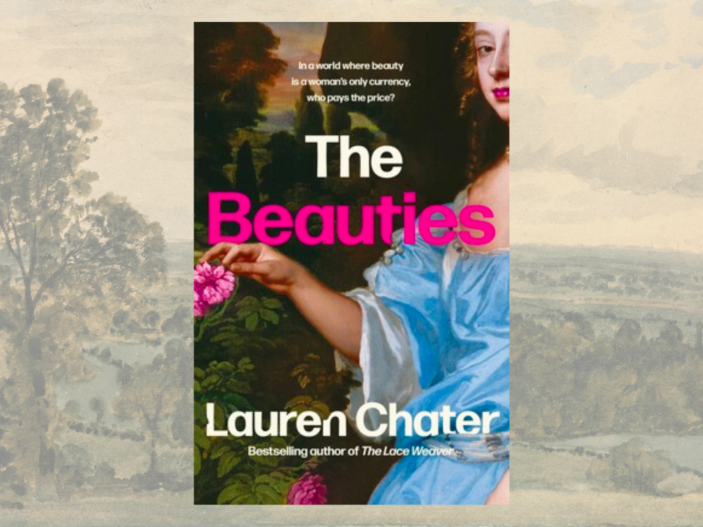
Bestselling author of historical fiction, Lauren Chater returned this year with her latest novel, The Beauties – a story of independence, loyalty, desire and fine art.
The novel follows Emilia Lennox, a noblewoman who loses everything when it is discovered that her husband’s family have aided and abetted traitors to the crown in the years following the restoration of the English monarchy. Emilia, a woman who is widely acknowledged to be extremely beautiful, is herself fascinated by beauty, and laments the loss of her in-laws’ collection of paintings most of all. She has no choice but to travel to London, where she is taken in by a childhood friend, now working as an actress, while her husband seeks work elsewhere.
While in London, Emilia attracts the attention of the King, Charles II. At first, her aim is to petition him to restore her family’s land and titles, but when the King proposes an arrangement in return for this favour, Emilia hesitates. If she agrees to become the King’s mistress, he will give her what she wants. Or rather, what her husband wants. But said husband is very far away, and does not even respond to Emilia’s letters when she writes to ask him what she should do. Emilia, loyal to a fault, is torn between betraying her husband by becoming the king’s mistress, and betraying him by failing to restore him to his proper place in society.
The answer to her dilemma comes in the form of an interesting series of portraits commissioned by the Duchess of York. These portraits, supposedly of the most beautiful women of England (though in reality of those with the most status and influence, one suspects) are to be painted by the Dutch artist, Peter Lely. When Emilia meets Lely’s apprentice, Henry, at an art auction she attends with the King, she decides to agree to his terms, but to ask for something for herself too. She asks to be included among the portraits.
If the arrangement of this deal all feels a little complex, perhaps it is. Emilia, while not a vain person, is interested in art, and if she cannot be the artist then perhaps she feels that being the subject is the next best thing. She shares this passion for art with the other two points of view in the novel: Anne, the Duchess of York – whose story is told somewhat at a remove from the other two, and adds scenery and context to some of the book – and Henry, who is an apprentice and is forced to consider through the course of events the privileges that his position affords him, even while he is observing the absurd privilege of the upper classes from the outside.
Henry and Emilia come together as intellectual equals, and while theirs is more of a slow burn rather than a passionate romance, it is nonetheless one that readers will root for. The other romance of the story, that of the Duke of York and the future Duchess, makes for an interesting counterpart. Though at times the two stories (which braid together) seem only cursorily related, they do pair together nicely, and all three point of view characters make for compelling reading.
As with Lauren Chater’s previous historical novels (such as The Winter Dress and Gulliver’s Wife), the historical setting of this latest book is richly drawn, evoking the sights and smells of London. While Chater’s previous novels all focused on the history of fashion and textiles, this novel is a departure and instead examines the history of art and artists in the court of Charles II. Chater’s skill as a researcher is evident, and she is adept at weaving her knowledge into a page-turning read without bogging the reader down with an overload of facts.
If you’re a fan of Natasha Lester and you haven’t given Lauren Chater’s work a try yet, make sure to add this beautiful book to your list.
![]()
![]()
![]()
![]()
![]()
FOUR STARS (OUT OF FIVE)
The Beauties by Lauren Chater is available now from Simon and Schuster. Pick up a copy from Booktopia HERE.
